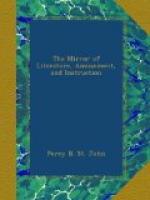No intellectual enjoyment, in my opinion, can surpass the delight we experience when traversing those spots of the habitable earth where celebrated warriors fought, minstrels sang, philosophers pondered, or where philanthropists have immortalized their names by deeds of charity. To roam through the romantic vales of Italy—surrounded at all turns by the sad memorials of its former magnificence—the mighty ruins of its temples and palaces, and the mutilated remains of its statues and triumphal columns, conveying to the mind mournful images of the fallen fates of those who had for ages been its proud possessors; where the Mantuan bard first caught inspiration from the deathless muse; where Tully charmed the listening throng, whilst defending with mild persuasion the arts and the sciences he loved, and condemning in terrible denunciations the mad ambition that threatened the destruction of his country; to wander among its groves, and say, here Ovid, in lonely exile, soothed his sorrows with the melody of his heaven-inspired strain; here Petrarch wooed his much-loved Laura in sonnets soft as the affection that gave them birth; here Tasso made history and Jerusalem immortal by crowning them with the garlands of his Promethean genius; and here Ariosto, Dante, Metastasio, and a galaxy of poets and philosophers shed the splendour of their gifted imaginations on the expiring greatness of their country.
Where is the portion of the civilized globe that has not some delightful reminiscence connected with it? There is not a country in the world, even the most barbarous, where the inhabitants will not feel pride and pleasure in pointing out to your attention some sacred spot ever dear to their memories: some battle-field or scene of conquest; some warrior’s grave; some monarch’s sepulchre, or some chieftain or legislator’s dwelling. And what shall we say of the classic soil of Greece? where the eye cannot turn, or the foot move to a place which is not eternalized by its associations: where the waters will not remind you of Castalian founts; the flowers of Parnassian wreaths; the eminences of the Phocian hills; and where the air of all breathes inspiration. To a mind prone to contemplation, a walk through Athens must awaken the most exquisite reveries. Although “fallen from its high estate,” there is enough in the tottering ruins which yet remain to recall the history of its ancient grandeur: the shattered Acropolis and the Pyraeus tell the tale of other days, in language at once pathetic and intelligible—
“The time has been when they
were young and proud,
Banners on high and battles pass’d
below.”




